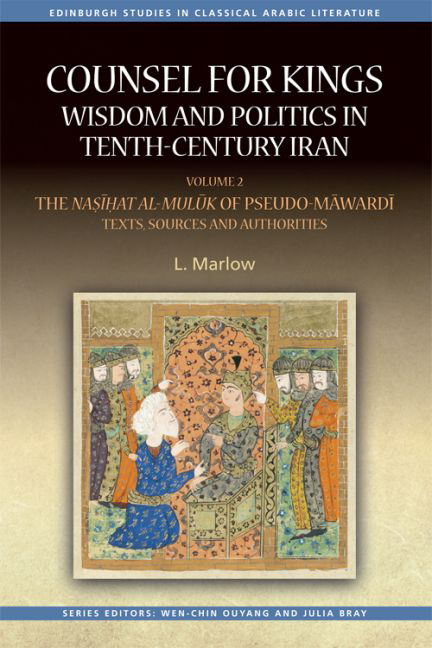 Counsel for Kings: Wisdom and Politics in Tenth-Century Iran
Counsel for Kings: Wisdom and Politics in Tenth-Century Iran 5 - The Governance of the Common People
from Part II - The Three Governances: Translations and Commentary
Published online by Cambridge University Press: 07 October 2017
Summary
The seventh chapter of Naṣīḥat al-mulūk and the third in Pseudo- Māwardī's sequence of siyāsāt is devoted to the common people or ʿāmma. It provides numerous examples of Pseudo-Māwardī's use of texts, vehicles of meanings that were neither singular nor static; he moulds the meaning of his texts by integrating them into his argument and by juxtaposing them with other texts, in order to create a cumulative and collective effect. Pseudo-Māwardī opens his chapter with a reminder of the ruler's moral injunction to imitate the divine attributes and follow the divine commandments. Invoking God's instructive conduct (ādāb Allāh), he emphasises the divine qualities of mercy and justice. He reiterates the king's central responsibility to maintain his obligation to abide by his promises, to meet his subjects’ rightful expectations, and to strive continually to exhibit greater generosity towards them. Only in rare cases does Pseudo-Māwardī endorse punishment; much more commonly he counsels the restoration of reciprocal ties of loyalty. Like the previous chapter, chapter seven of Naṣīḥat al-mulūk demonstrates the model of cooperation and necessary mutual dependence between the ruler and his subjects, more particularly the subjects who mediate between the royal person and the population at large.
The chapter opens in Pseudo-Māwardī's usual manner, with a sequence of Qurʾānic quotations. Again, Pseudo-Māwardī employs these quotations in order to organise his argument, and groups them into three divisions. The first cluster of Qurʾānic fragments emphasises God's self-description as merciful and just. The second group demonstrates God's distinguishing of His Prophet by the same characteristics, compassion and fairness (qisṭ). The third consists of Qurʾānic texts that affirm human accountability and reject the notion of divine injustice:
We have already mentioned previously in our book that it is incumbent on the excellent king and consummate ruler (al-malik al-fā∂il wa-l-sāʾis al-kāmil) that he imitate God, insofar as His servants possess the capacity to perceive the divine model and to the extent that effort and exertion allow, and that he observe His command, and encourage that which He has encouraged and praised.
- Type
- Chapter
- Information
- Counsel for Kings: Wisdom and Politics in Tenth-Century IranThe Nasihat al-muluk of Pseudo-Mawardi: Texts, Sources and Authorities, pp. 197 - 245Publisher: Edinburgh University PressPrint publication year: 2016


